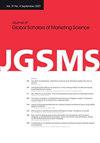Effects of empathy and egoism on CSR perceptions and consumer buycotts: Lessons learned during global crisis in support of equitable business practices
IF 2.7
Q3 BUSINESS
Journal of Global Scholars of Marketing Science
Pub Date : 2023-11-06
DOI:10.1080/21639159.2023.2255866
引用次数: 0
Abstract
ABSTRACTConsumer polarization leading to buycotts and boycotts was magnified by the global crisis of 2020–2021 which changed consumer priorities and business practices: in-person shopping decreased, while social distancing, remote work, and media consumption increased. In this context, we examined the relationships among egoism, empathy, and consumer interest in social topics. These topics included employee treatment, social justice, and the environment. We highlighted aligning Corporate Social Responsibility (CSR) efforts with consumer values. Using a survey method and structural equation modeling, we found such efforts increased consumer buycott. In this research we addressed whether consumers were motivated by empathy or egoism to engage in buycotting during global crisis. Consumers reacted to a firm’s adherence to health and safety guidelines, respect for human rights, and engaged in environmental protection. This study contributes to the literature on CSR and prosocial behavior. It examined the relationships among key consumer characteristics and corporate behavior in times of crisis and expands the existing literature on psychological factors that play a role in buycotting. The findings are applicable to policy makers, academic literature, and practice as it offers practical recommendations on how companies might consider realignment of CSR activities during crisis. It also suggests directions for future research.KEYWORDS: EmpathyegoismCSRequitybuycott Disclosure statementNo potential conflict of interest was reported by the author(s).同理心和利己主义对企业社会责任认知和消费者购买行为的影响:在全球危机中获得的支持公平商业行为的经验教训
【摘要】2020-2021年的全球危机放大了导致购买和抵制的消费者两极分化,这场危机改变了消费者的优先事项和商业惯例:面对面购物减少,而社交距离、远程工作和媒体消费增加。在此背景下,我们研究了利己主义、同理心和消费者对社会话题的兴趣之间的关系。这些主题包括员工待遇、社会公正和环境。我们强调将企业社会责任工作与消费者价值观结合起来。使用调查方法和结构方程模型,我们发现这样的努力增加了消费者的购买。在这项研究中,我们探讨了消费者在全球危机期间购买商品是出于同理心还是出于利己主义。消费者对公司遵守健康和安全准则、尊重人权和参与环境保护作出反应。本研究为企业社会责任与亲社会行为的研究提供了文献依据。它研究了危机时期关键消费者特征与企业行为之间的关系,并扩展了关于心理因素在购买中发挥作用的现有文献。研究结果适用于政策制定者、学术文献和实践,因为它为公司在危机期间如何考虑重新调整CSR活动提供了实用的建议。它也为未来的研究指明了方向。关键词:共情行为mcsrequitybuycott披露声明作者未报告潜在的利益冲突。
本文章由计算机程序翻译,如有差异,请以英文原文为准。
求助全文
约1分钟内获得全文
求助全文

 求助内容:
求助内容: 应助结果提醒方式:
应助结果提醒方式:


